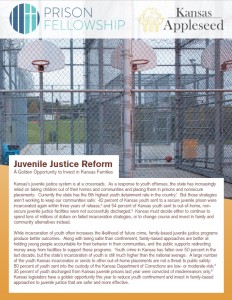Report from Kansas Appleseed and Prison Fellowship as Kansas Lawmakers Debate New Bill to Reduce Youth Incarceration
TOPEKA – A new report issued today by Kansas Appleseed and Prison Fellowship outlines the myriad problems currently plaguing the juvenile justice system in Kansas and the opportunity during the current legislative session for real and lasting changes that invest in families instead of incarceration.
The key findings of the report include:
- Family- and community-based programs do a better job than incarceration at holding youth accountable and reducing future offenses.
- Kansas spends over $53 million a year to put youth in prison or place them outside of their home, which costs taxpayers even more as youth incarceration increases the chances of recidivism in the juvenile or adult corrections system;
- 80 percent of youth sent to custody of the Kansas Department of Corrections are low or moderate risk; and
- Youth crime in Kansas is lower than the national average and has fallen over 50 percent in the last decade, but the state’s incarceration of youth remains much higher than the national average.
The report also explains that the state’s funds dedicated to juvenile justice should be “re-directed towards efforts that would make our youth justice system more financially sustainable while generating social and economic dividends in the future.”
“The immense problems with our current juvenile justice system combined with the broad range of support across the state for a more just and accountable system has set the stage for the reforms Kansas needs,” said Benet Magnuson, Executive Director of Kansas Appleseed and a member of Kansans United for Youth Justice. “Lawmakers have an opportunity to make our juvenile justice system more fair, safe, and efficient.”
“Social and fiscal conservatives, both in Kansas and in other states, are awakening to a more effective way to hold youth accountable when they break the law,” said Craig DeRoche, Senior Vice President for Policy and Advocacy at Prison Fellowship. “This report shows that family and community-based programs do a better job of increasing public safety, transforming lives, and saving taxpayer dollars.”
